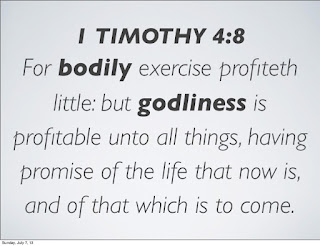7
Christian Principles to Grow Your Faith:
Building
a Stronger Trust Series
Part 5 Godliness:
Over the past four weeks,
our insight into Apostle Peter’s teachings of adding principles to faith (2 Peter 1:5-7 NKJV) enlightened us with its wisdom. His keen understanding of virtue, knowledge, self-control and
perseverance allowed us to see how they make us more faithful. Through adding them
into our Christian actions, we prepared ourselves
for his next affirmation-- godliness.
Contain in the pages of the Bible is where we find sanctity. The Old and New Testaments filled with commands designed for living in God’s will. Without understanding the Lord’s
outline for living in His Kingdom, then we
won’t know Christ. And eternal life isn’t possible.
When I pondered over godliness many thoughts entered my mind.
Unconditional love topped the list, and
Peter included this in his message. Kindness was another high ranking attribute
and again on Peter’s list of unwavering faith. The next two parts will highlight those.
Then forgiveness and selflessness crowded my mind. Those two
Christian essentials shape our spiritual lives. They are the outer expressions showing
the inward godliness from a life centered in Christ. Those around us are
embraced with holiness from receiving the godliness behind our action. Because of practicing them our faith is anchored in
God’s truth radiating to the world righteousness.
Forgiveness is soul food for the heart. We learn forgiveness
from God Himself. God’s forgiveness is comforting, uplifting and full of grace.
When God forgives, He touches us in a profound and powerful way. Our
closeness with Him intensifies and though we may be undeserving His love is overwhelming.
It’s easy to let go of our hurt by those we cherish. To
forgive the ones we love doesn’t take much effort. Acceptance of their sinful
ways isn’t hard.
The real lesson in forgiving trespasses comes in those
relations with people we despise, dislike or irritate us. It’s tough to forgive
the folks who annoy us.
We meet them in our
families, at the job, in social events and on the streets. They are unavoidable.
When they harm us, we internalize the
injustice deep inside our souls. Our heart latches onto the wrong blocking the godly
act of forgiving.
We don’t want to let go because their mistreatment is unwarranted, and we hold on to the pain. Our bitterness increases when we ponder over their unfair treatment. Failing to forgive is
casting the first stone for we have forgotten each of us are sinners. Remember, God won’t forgive us until we forgive others. (Matthew 6: 14-15)
Unforgiving leads to a hardened heart robbing us from
serenity. God is watching how we treat others,
and until we let go of our wrongfulness towards them,
we continue to suffer. Forgiveness isn’t condoning their sin. It’s living in
the likeness of Christ. The unrighteousness of others isn’t ours to
judge. We leave it in God’s hand. Our responsibility is to do the will of the
Lord and place our faith in His perfect justice.
I am grateful to Christ for working with me and teaching the
essence of forgiving. When I walked in darkness (before my salvation) my reaction
towards being hurt was full of hate, anger and bitterness. “Get even” was my
motto, and I assassinated their reputation through slander.
So when God rescued me and Christ saved me I had to amend
those wrongs. Then part of my repentance forgave
them. Today I have improved upon forgiving others. I still struggle with
forgiveness, but learning its value is worthwhile. Through forgiving my faith is
stronger since I know Christ guides me past my limitations and into godliness.
Every time I rely on God the impossible becomes possible.
Selflessness is a rewarding way of serving God, Christ, and others. Again, we learn unselfishness
from God. The Lord is our greatest teacher,
and His selfless actions are incredible. Our Father planned for us before our
conception and gave us life without reservations. His gift was free, and we had no choice.
Another way God shows selflessness is through His death,
resurrection and Ascension back into heaven. Christ grants salvation to anyone
who is faithful and makes it available to everyone
(Titus 2:11).
Humility paves the way to a life full of giving without
expecting a return. Altruism removes self-recognition where the motive for
giving is pure and unselfish. When we can
sacrifice personal desires for helping the welfare of our neighbors, then our faith is strengthened.
And we walk away from those encounters with a renewed spirit
knowing we acted in godliness. Good deeds are a necessity and an example of a
faithful follower. God designed it this way,
so we can help each other in acts of generosity.
The Lord will show you where to take part in unselfish giving.
God knows your strengths and places you in the best position to maximize your effective giving. That means you have to be
ready and by devoting yourself to Christ, you are prepared for selfless service.
The Lord will direct your selfless path.
I’m learning to give more of myself. My life is simple. Not
being married allows me to spend time away from work offering personal
resources to the causes. I let others
know I’m available to help and God uses me to share the Good News. When I pray for others, I ask God to do His will in their
lives before He does it in mine. As the results from those actions I have a renewed and the Holy Spirit is noticeable.
Godliness is a lifetime of devoting ourselves to Christ’s
divinity. The more we live in God’s will,
the better holiness becomes a working
part of our faith. Christ has redeemed us from our sins and presented us with
God’s new Covenant. And what we do with it has eternal consequences.






No comments:
Post a Comment